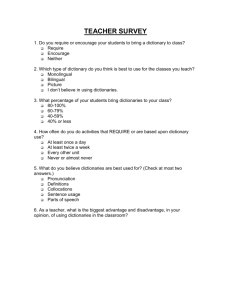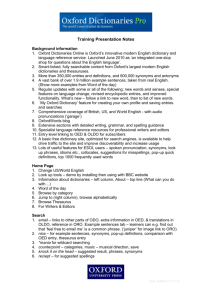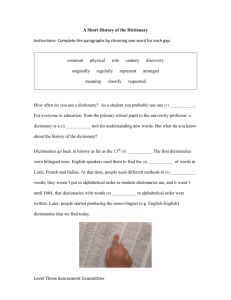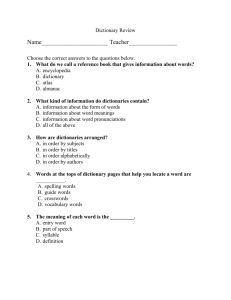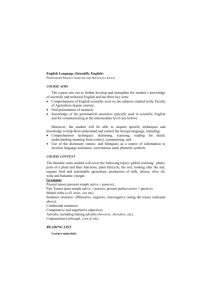Oxford Dictionaries Online quarterly update: new words added to
advertisement
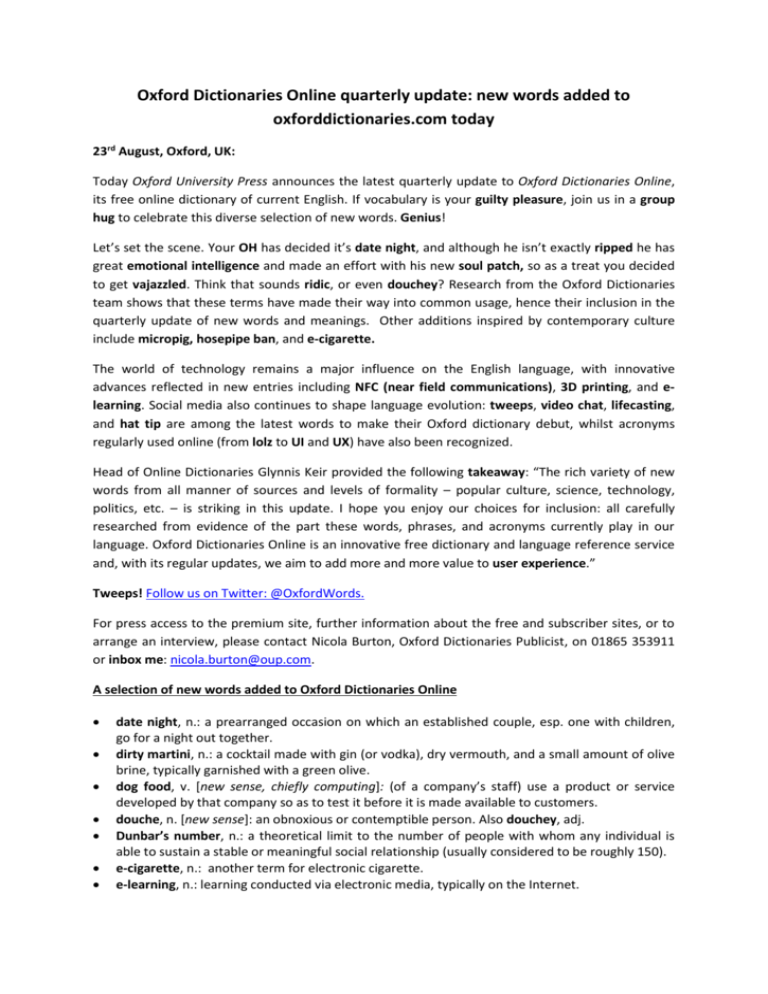
Oxford Dictionaries Online quarterly update: new words added to oxforddictionaries.com today 23rd August, Oxford, UK: Today Oxford University Press announces the latest quarterly update to Oxford Dictionaries Online, its free online dictionary of current English. If vocabulary is your guilty pleasure, join us in a group hug to celebrate this diverse selection of new words. Genius! Let’s set the scene. Your OH has decided it’s date night, and although he isn’t exactly ripped he has great emotional intelligence and made an effort with his new soul patch, so as a treat you decided to get vajazzled. Think that sounds ridic, or even douchey? Research from the Oxford Dictionaries team shows that these terms have made their way into common usage, hence their inclusion in the quarterly update of new words and meanings. Other additions inspired by contemporary culture include micropig, hosepipe ban, and e-cigarette. The world of technology remains a major influence on the English language, with innovative advances reflected in new entries including NFC (near field communications), 3D printing, and elearning. Social media also continues to shape language evolution: tweeps, video chat, lifecasting, and hat tip are among the latest words to make their Oxford dictionary debut, whilst acronyms regularly used online (from lolz to UI and UX) have also been recognized. Head of Online Dictionaries Glynnis Keir provided the following takeaway: “The rich variety of new words from all manner of sources and levels of formality – popular culture, science, technology, politics, etc. – is striking in this update. I hope you enjoy our choices for inclusion: all carefully researched from evidence of the part these words, phrases, and acronyms currently play in our language. Oxford Dictionaries Online is an innovative free dictionary and language reference service and, with its regular updates, we aim to add more and more value to user experience.” Tweeps! Follow us on Twitter: @OxfordWords. For press access to the premium site, further information about the free and subscriber sites, or to arrange an interview, please contact Nicola Burton, Oxford Dictionaries Publicist, on 01865 353911 or inbox me: nicola.burton@oup.com. A selection of new words added to Oxford Dictionaries Online date night, n.: a prearranged occasion on which an established couple, esp. one with children, go for a night out together. dirty martini, n.: a cocktail made with gin (or vodka), dry vermouth, and a small amount of olive brine, typically garnished with a green olive. dog food, v. [new sense, chiefly computing]: (of a company’s staff) use a product or service developed by that company so as to test it before it is made available to customers. douche, n. [new sense]: an obnoxious or contemptible person. Also douchey, adj. Dunbar’s number, n.: a theoretical limit to the number of people with whom any individual is able to sustain a stable or meaningful social relationship (usually considered to be roughly 150). e-cigarette, n.: another term for electronic cigarette. e-learning, n.: learning conducted via electronic media, typically on the Internet. ethical hacker, n.: a person who hacks into a computer network in order to test or evaluate its security, rather than with malicious or criminal intent. manage expectations, phr.: seek to prevent disappointment by establishing in advance what can realistically be achieved or delivered by a project, undertaking, course of action, etc. genius, adj. [new sense]: very clever or ingenious. group hug, n.: a number of people gathering together to hug each other, typically to provide support or express solidarity. guilty pleasure, n.: something, such as a film, television programme, or piece of music, that one enjoys despite feeling that it is not generally held in high regard. hackathon, n.: an event, typically lasting several days, in which a large number of people meet to engage in collaborative computer programming. hat tip, n.: (in online contexts) used as an acknowledgement that someone has brought a piece of information to the writer’s attention, or provided the inspiration for a piece of writing. hosepipe ban, n.: an official restriction on the use of hosepipes, imposed by a particular water company on its customers during a water shortage. inbox, v.: send a private message or an email to (someone, typically another member of a social networking site or Internet message board). lifecasting, n.: the practice of broadcasting a continuous live flow of video material on the Internet which documents one’s day-to-day activities. lolz, pl. n.: fun, laughter, or amusement. mansion tax, n.: a tax levied on residential properties worth more than a certain amount. micro pig, n.: a pig of a very small, docile, hairless variety, sometimes kept as a pet. mood disorder, n.: a psychological disorder characterized by the elevation or lowering of a person’s mood, such as depression or bipolar disorder. mwahahaha, exclamation: used to represent laughter, esp. manic or cackling laughter such as that uttered by a villainous character in a cartoon or comic strip. NFC, abbrev.: near field communication, a technology allowing the short-range wireless intercommunication of mobile phones and other devices for purposes such as making payments. OH, n.: a person’s wife, husband, or partner (used in electronic communication). photobomb, v.: spoil a photograph of (a person or thing) by suddenly appearing in the camera’s field of view as the picture is taken, typically as a prank or practical joke (n.: photobombing). ridic, adj.: ridiculous (abbrev.). ripped, adj. [new sense]: having well-defined or well-developed muscles; muscular. soul patch, n.: a small tuft of facial hair directly below a man’s lower lip. takeaway, n. [new sense]: a key fact, point, or idea to be remembered, typically one emerging from a discussion or meeting. tweeps, pl. n.: a person’s followers on the social networking site Twitter. UI, n.: short for ‘user interface’. user experience, n.: the overall experience of a person using a product such as a website or a computer application, esp. in terms of how easy or pleasing it is to use (also UX, n.). vajazzle, v.: adorn the pubic area (of a woman) with crystals, glitter, or other decoration. video chat, n.: a face-to-face conversation held over the Internet by means of webcams and dedicated software. vote, v. [new sense: vote someone/thing off the island]: dismiss or reject someone or something as unsatisfactory [with reference to the reality television Survivor). Wikipedian, n.: a person who contributes to the collaboratively written online encyclopedia Wikipedia, esp. on a regular basis. 3D printing, n.: a process for making a physical object from a three-dimensional digital model, typically by laying down many successive thin layers of a material. Notes for Editors Oxford Dictionaries Online (ODO) is Oxford University Press’s innovative free dictionary and language reference service. Key features of the site include a comprehensive current English dictionary and up-to-date bilingual dictionaries in French, German, Italian, and Spanish. The site is updated quarterly with some or all of the following: new words and senses, special features on language change, revised encyclopedic entries, and improved functionality. Free on Oxford Dictionaries Online: Comprehensive current English dictionary with British/World English or US English options Up-to-date bilingual dictionaries in French, German, Italian, and Spanish English grammar and usage tips, spelling guidance, and punctuation advice Practical advice on everyday writing tasks Puzzles and games Word of the Day OxfordWords blog, featuring articles about words, language, and dictionaries, plus interactive features, games, competitions, and more… Further FAQs regarding ODO. Additional features of the premium subscriber site Oxford Dictionaries Pro: Smart-linked, fully searchable content from Oxford’s largest modern English dictionaries and thesauruses More than 350,000 definitions and 600,000 synonyms and antonyms A vast bank of over 1.9 million example sentences, taken from real English A ‘My Oxford Dictionary’ feature for creating your own profile and saving entries and searches Comprehensive coverage of British, US, and World English - with audio pronunciations Extensive sections with detailed writing, grammar, and spelling guidance Specialist language reference resources for professional writers and editors *For press access to ODO Pro, email nicola.burton@oup.com What’s the difference between ODO and the OED? It is important to note that the new words mentioned above have been added to Oxford Dictionaries Online, not the Oxford English Dictionary. Why is this? The dictionary content in ODO focuses on current English and includes modern meanings and uses of words The OED, on the other hand, is a historical dictionary and it forms a record of all the core words and meanings in English over more than 1,000 years, from Old English to the present day, including many obsolete and historical terms. Words are never removed from the OED. More on the differences between ODO and OED More on how a new word enters an Oxford dictionary
